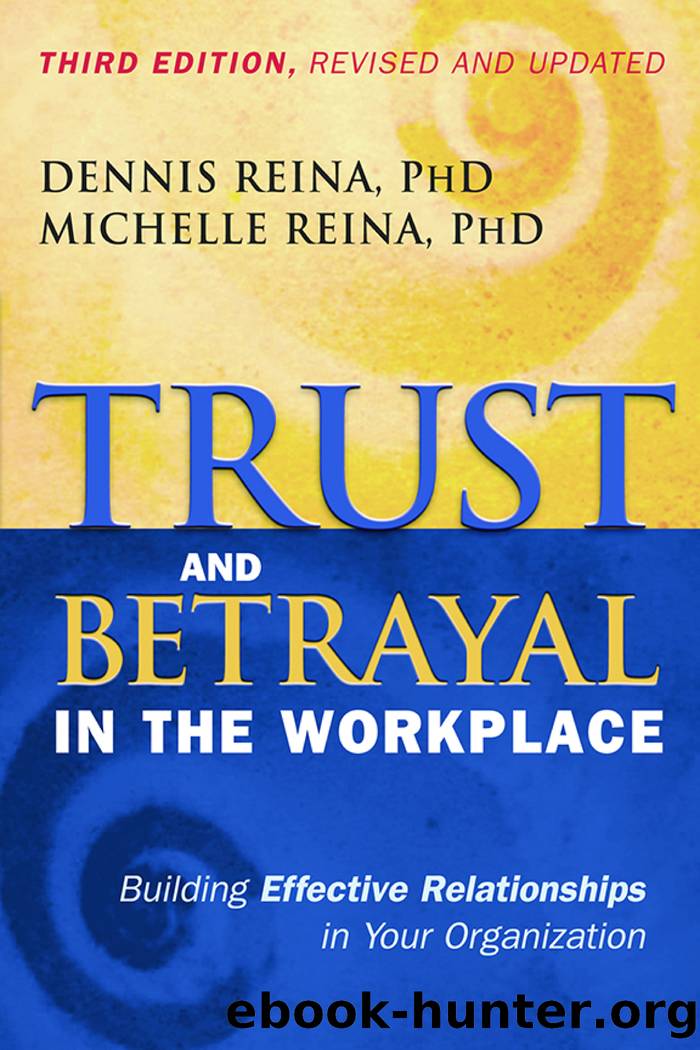Trust and Betrayal in the Workplace : Building Effective Relationships in Your Organization (9781626562592) by Reina Dennis; Reina Michelle & Michelle Reina

Author:Reina, Dennis; Reina, Michelle & Michelle Reina
Language: eng
Format: epub
Publisher: Berrett-Koehler Pub
Published: 2015-02-14T16:00:00+00:00
Youâve been influenced about who, how, and when
to trust from the moment you were born.
Understandably, if you learned that others could be counted on to be there for you, your Capacity for Trust expanded, and you developed a readiness to enter into relationships by extending your trust until it was proven unsafe to do so. Conversely, if your upbringing was riddled with inconsistencies, letdowns, or upheavals, your Capacity for Trust contracted. You may have learned that it wasnât safe to trust. In this case, you may have developed a need for tangible evidence before you could be confident that others could be trusted.
Most peopleâs childhoods were mixtures of calm and chaos, situations that caused trust to grow and contract accordingly. In these cases, it wasnât necessarily the ambiguity itself that influenced your Capacity for Trust but the skill with which your care-givers managed it.
Michelleâs father served as a military intelligence officer, and throughout her childhood, her family moved every two years in response to his assignments. Michelle was born in Eritrea during Ethiopian rule, and as a young child, her first swim was in the Red Sea. Michelleâs mother beamed when the emperor, Haile Selassie, held her infant daughter in his arms. The family later lived in Japan during the Vietnam War. After each new assignment, Michelle would kiss her father good-bye and never knew where he was going or when or if she would see him again. Before she was born, her father had been held in captivity during the Korean War. Michelle had heard the stories of his imprisonment, and she carried with her the knowledge that bad things happened to good people during wartime. Despite the familyâs constant relocation and changing, unpredictable environments, however, Michelleâs mother and father created a level of consistency and continuity within their household. This stability expanded Michelleâs Capacity for Trustâeven in the midst of unimaginable change and heart-wrenching uncertainty.
Over time, as you developed mentally, emotionally, physically, and spiritually, you became more self-reliant and learned to trust your own perceptions and judgment. As you mastered developmental tasks that were appropriately acknowledged by your caregivers, you began to have confidence in your abilities. These early experiences influenced your willingness to take risks and to trust in your competence to resolve problems and overcome difficult situations.
Eventually, this approach evolved into a more complex understanding of the world. What began as an I trust it because I can see it attitude expanded to include the idea of reciprocity: If I do something for you, will you do something for me? As your thoughts grew in sophistication, you caught glimpses of the pinnacle of trusting relationships: You have my word that you can depend on me, no matter what.
As you progressed through young adulthood, your earliest conditioning still formed the basis of your knee-jerk reactions to situations; your actual response, however, may have matured. For example, when your friend didnât call like he said he would on a Saturday morning, your initial fear may have been that he found something better to do than play a pick-up basketball game with you.
Download
This site does not store any files on its server. We only index and link to content provided by other sites. Please contact the content providers to delete copyright contents if any and email us, we'll remove relevant links or contents immediately.
Zero to IPO: Over $1 Trillion of Actionable Advice from the World's Most Successful Entrepreneurs by Frederic Kerrest(4048)
Machine Learning at Scale with H2O by Gregory Keys | David Whiting(3617)
Harry Potter and the Goblet Of Fire by J.K. Rowling(3608)
Never by Ken Follett(3523)
Ogilvy on Advertising by David Ogilvy(3327)
Shadow of Night by Deborah Harkness(3173)
The Man Who Died Twice by Richard Osman(2807)
Book of Life by Deborah Harkness(2717)
My Brilliant Friend by Elena Ferrante(2698)
How Proust Can Change Your Life by Alain De Botton(2613)
0041152001443424520 .pdf by Unknown(2592)
Will by Will Smith(2577)
The Tipping Point by Malcolm Gladwell(2555)
How to Pay Zero Taxes, 2018 by Jeff A. Schnepper(2499)
Purple Hibiscus by Chimamanda Ngozi Adichie(2481)
Hooked: A Dark, Contemporary Romance (Never After Series) by Emily McIntire(2416)
Rationality by Steven Pinker(2148)
Borders by unknow(2116)
Daughter of Smoke and Bone by Laini Taylor(2077)
